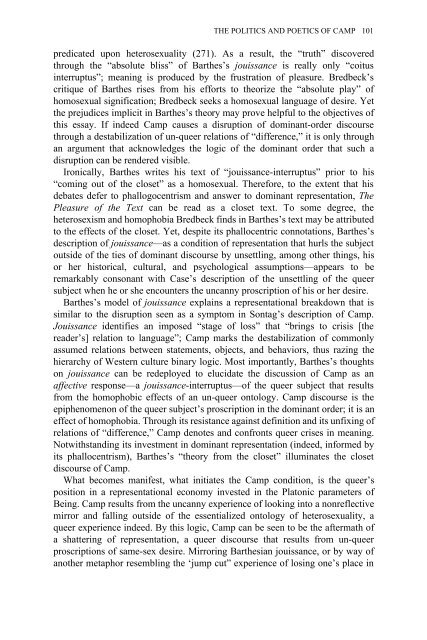Edited by Moe Meyer - Get a Free Blog
Edited by Moe Meyer - Get a Free Blog
Edited by Moe Meyer - Get a Free Blog
You also want an ePaper? Increase the reach of your titles
YUMPU automatically turns print PDFs into web optimized ePapers that Google loves.
THE POLITICS AND POETICS OF CAMP 101<br />
predicated upon heterosexuality (271). As a result, the “truth” discovered<br />
through the “absolute bliss” of Barthes’s jouissance is really only “coitus<br />
interruptus”; meaning is produced <strong>by</strong> the frustration of pleasure. Bredbeck’s<br />
critique of Barthes rises from his efforts to theorize the “absolute play” of<br />
homosexual signification; Bredbeck seeks a homosexual language of desire. Yet<br />
the prejudices implicit in Barthes’s theory may prove helpful to the objectives of<br />
this essay. If indeed Camp causes a disruption of dominant-order discourse<br />
through a destabilization of un-queer relations of “difference,” it is only through<br />
an argument that acknowledges the logic of the dominant order that such a<br />
disruption can be rendered visible.<br />
Ironically, Barthes writes his text of “jouissance-interruptus” prior to his<br />
“coming out of the closet” as a homosexual. Therefore, to the extent that his<br />
debates defer to phallogocentrism and answer to dominant representation, The<br />
Pleasure of the Text can be read as a closet text. To some degree, the<br />
heterosexism and homophobia Bredbeck finds in Barthes’s text may be attributed<br />
to the effects of the closet. Yet, despite its phallocentric connotations, Barthes’s<br />
description of jouissance—as a condition of representation that hurls the subject<br />
outside of the ties of dominant discourse <strong>by</strong> unsettling, among other things, his<br />
or her historical, cultural, and psychological assumptions—appears to be<br />
remarkably consonant with Case’s description of the unsettling of the queer<br />
subject when he or she encounters the uncanny proscription of his or her desire.<br />
Barthes’s model of jouissance explains a representational breakdown that is<br />
similar to the disruption seen as a symptom in Sontag’s description of Camp.<br />
Jouissance identifies an imposed “stage of loss” that “brings to crisis [the<br />
reader’s] relation to language”; Camp marks the destabilization of commonly<br />
assumed relations between statements, objects, and behaviors, thus razing the<br />
hierarchy of Western culture binary logic. Most importantly, Barthes’s thoughts<br />
on jouissance can be redeployed to elucidate the discussion of Camp as an<br />
affective response—a jouissance-interruptus—of the queer subject that results<br />
from the homophobic effects of an un-queer ontology. Camp discourse is the<br />
epiphenomenon of the queer subject’s proscription in the dominant order; it is an<br />
effect of homophobia. Through its resistance against definition and its unfixing of<br />
relations of “difference,” Camp denotes and confronts queer crises in meaning.<br />
Notwithstanding its investment in dominant representation (indeed, informed <strong>by</strong><br />
its phallocentrism), Barthes’s “theory from the closet” illuminates the closet<br />
discourse of Camp.<br />
What becomes manifest, what initiates the Camp condition, is the queer’s<br />
position in a representational economy invested in the Platonic parameters of<br />
Being. Camp results from the uncanny experience of looking into a nonreflective<br />
mirror and falling outside of the essentialized ontology of heterosexuality, a<br />
queer experience indeed. By this logic, Camp can be seen to be the aftermath of<br />
a shattering of representation, a queer discourse that results from un-queer<br />
proscriptions of same-sex desire. Mirroring Barthesian jouissance, or <strong>by</strong> way of<br />
another metaphor resembling the ‘jump cut” experience of losing one’s place in


